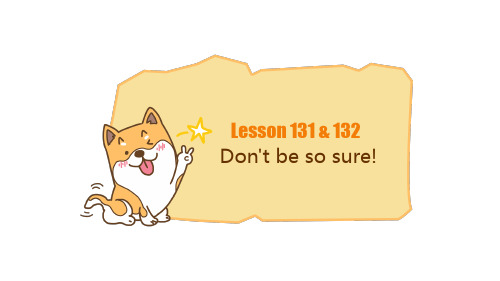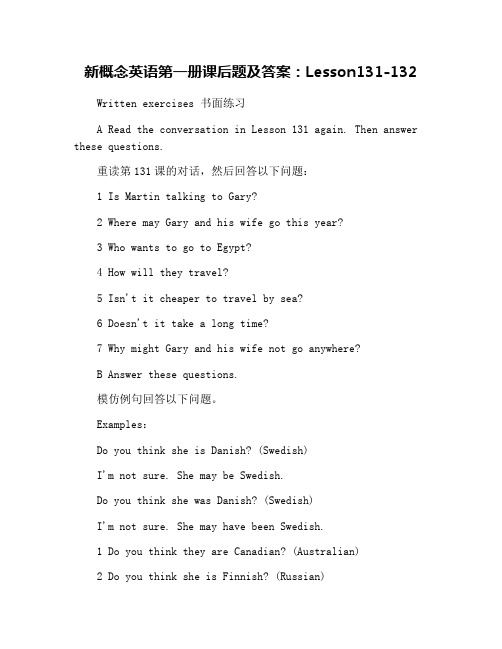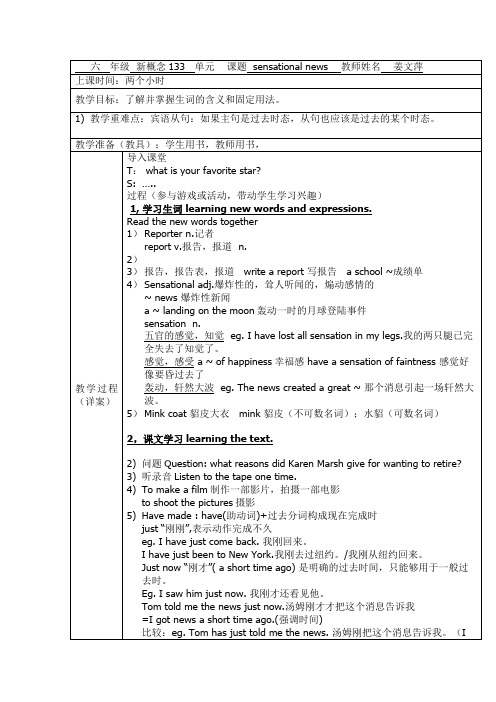新概念英语教案-第一册-lesson-131-132
新概念英语NCE1_lesson131-132(共51页)课件

It depends on whether they win or not.
② v. 依靠;依赖 The country depends heavily on its export of farming products.
Lesson 131 Don't be so sure!
worry ① v. 担忧;发愁
worry about worry too much
She’s worried that she might lose her job soon.
② v. 困扰;使不安宁 She is always worrying him for presents.
③ v. 引领;(初次)提出 He introduced a new topic for our discussion.
really ① adv. 真正地;确实地
He wants to know what really happened.
② adv. (用以加强语气)实在;其实 You don’t really expect him to believe that.
③ v. (口)非常好;给人深刻印象的 She looks sensational in that dress!
wonder ① v. 感到好奇;想要知道
I wonder why he hasn’t come.
② v. 感到惊讶(或诧异) I shouldn’t wonder if she is elected.
Just let me try!
Her parents wouldn’t let her go out with that boy.
新概念英语第一册第131-132课

It may be cheaper, but it takes a long time. take 花费,占用 It takes sb. some time to do sth 做某事占用了某人…时间
做这件事用了我1小时的时间。 It took me 1 hour to do the job. 我花了1小时来做这项工作。 I spent one hour doing the job.
Don’t be so sure. We might not go anywhere. might 表示非常不确定 anywhere 任何地方,副词作状语 somewhere某地,用于肯定句 nowhere 没有任何地方 我想去转转,但是因为下雨了,我哪也没去。 I wanted to go somewhere, but because of the rain, I went nowhere.
I’m sure you’ll enjoy yourselves. enjoy oneself=have a good time 玩得愉快 寒假你玩得痛快吗? Did you enjoy yourself during the winter vacation? Did you have a good time during the winter vacation?
•课文讲解
Where are you going to spend your holidays 课文讲解 this year, Gary?
spend v. 花费时间,金钱,度过时光,假日等 spend….on sth spend ….(in) doing sth 她把大量的钱花在(买)衣服上。 She spends a lost of money on clothes. 我每天花1小时做体育运动。 I spend one hour on sport every day.
新概念英语第一册Lesson131132Don’tbesosure小学英语初中英语全国通用

Review
重点回顾
2. 对过去情况的推断 肯定 : must have been… , 那时候肯定… 否定 : can't have been ... , 那时候不可能…
e.g. He must have been tired. 他那时肯定是累了。
He can't have been ill. 他那时不可能生病了。
might : 可以用来表示一 种可能性 , 程度弱于may, 后面需要加上动词原形。
表达可能性的词汇 : perhaps, may / possible, probably / likely / sure, certain <靠谱程度从前往后是递增的>
perhaps / may : 发生几率非常小。 sure / certain : 一定 , 肯定会发生。
查看答案解析
答案:abroad; 解析: 副词辨义. abroad adv. 国外 , 在国外 , 到国外; aboard adv. 在(船 , 飞机 , 火车)上; around adv. 到处;在附近;大约; ahead adv. 提前 , 预先;在前 , 向前; 译文:当他在国外安定下来时 , 他开始想念祖国了。
The question of who's going to look after everything at home. Nobody is going to look after everything at home.
课文动画
Vocabulary
词汇精讲
Egypt
n. 埃及
It's very mysterious.
Warm-up
课前热身
don't be ...
新概念英语第一册Lesson133--134

Grammar
Have you just made a new film, Miss Marsh? Yes, I have. Are you going to make another? No, I’m not. I’m going to retire. I feel very tired. I don’t want to make another film for a long time. She told me she had just made a new film. She said she was not going to make another. She said she was going to retire. She told reporters she felt very tired and didn’t want to make another film for a long time.’
新概念英语第一册 131-132课课件

A.costB.tookC.spent
3.It _A_/_B_ me an hour to write the letter.
A.costB.tookC.spent
• I’m sure you’ll enjoy yourselves.
• Don’t be so sure. We might not go anywhere.
My wife wants to go to Egypt. I’d like to go there, too. We can’t make up our minds.
would like to do sth 愿意 做某事,想做某事
would like sth 想要某物 make up one’s mind 下决 心,决定
spend—spent—spent
spend….on sth 花费(时间/金钱)在……上 spend ….(in) doing sth 花费(时间/金钱)做某事
Eg.她把大量的钱花在(买)衣服上。 She spends a lot of money on clothes. eg.我每天花1小时做体育运动。 I spend one hour (in )doing sports every day.
spend
take
cost
主语
只能是人
事,物或形式 主语it
事,物,人或 形式主语it。
宾语
时间或金钱 通常是钱
通常是时间
1.The computer_B_/_C me $2 000.
A.spendsB.costsC.takes
2.I _C__ all day looking for you yesterday.
当“度过“讲时句型结构为:
新概念英语第一册课后题及答案:Lesson131-132

新概念英语第一册课后题及答案:Lesson131-132 Written exercises 书面练习A Read the conversation in Lesson 131 again. Then answer these questions.重读第131课的对话,然后回答以下问题:1 Is Martin talking to Gary?2 Where may Gary and his wife go this year?3 Who wants to go to Egypt?4 How will they travel?5 Isn't it cheaper to travel by sea?6 Doesn't it take a long time?7 Why might Gary and his wife not go anywhere?B Answer these questions.模仿例句回答以下问题。
Examples:Do you think she is Danish? (Swedish)I'm not sure. She may be Swedish.Do you think she was Danish? (Swedish)I'm not sure. She may have been Swedish.1 Do you think they are Canadian? (Australian)2 Do you think she is Finnish? (Russian)3 Do you think they are Japanese? (Chinese)4 Do you think they were butchers? (bakers)5 Do you think she was a dentist? (doctor)6 Do you think he is a sales rep? (the boss)7 Do you think she is seventeen? (twenty-one)8 Do you think they were five? (seven)9 Do you think he was seventy-six? (over eighty)10 Do you think she was fifty-five? (under fifty)11 Do you think it is the 17th today? (16th)12 Do you think it was Tuesday yesterday? (Wednesday)13 Do you think it is the 19th today? (20th)14 Do you think it is cheap? (expensive)15 Do you think it was easy? (difficult)16 Do you think she was old? (young)17 Do you think he was ill? (tired)18 Do you think they are listening to the radio? (watching television)19 Do you think she was retiring? (looking for a new job)20 Do you think they are sitting? (standing)答案:Lesson132A1 Yes, Martin is talking to Gary.2 They may go abroad.3 Gary's wife wants to go to Egypt.4 They will travel by sea.5 Yes, it may be cheaper.6 Yes, it takes a long time.7 Because his wife worries too much.B1 I'm not sure. They may be Australian.2 I'm not sure. She may be Russian.3 I'm not sure. They may be Chinese.4 I'm not sure. They may have been bakers.5 I'm not sure. She may have been a doctor.6 I'm not sure. He may be the boss.7 I'm not sure. She may be twenty-one.8 I'm not sure. They may have been seven.9 I'm not sure. He may have been over eighty.10 I'm not sure. She may have been under fifty.11 I'm not sure. It may be the 16th today.12 I'm not sure. It may have been Wednesday yesterday.。
新概念英语第一册第131-132课-Don’t be so sure

新概念英语第一册第131-132课:Don’t be so sureLesson 131 Dont be so sure!别那么确定!Listen to the tape then answer this question.Whats the problem about deciding on a holiday?听录音,然后回答问题。
打算如何度假有什么犯难的地方?Martin: Where are you going to spend your holidays this year, Gary?马丁:加里,今年你们准备去哪里度假?Gary: We may go abroad. Im not sure. My wife wants to go to Egypt.Id like to go there, too. We cant make up our minds.加里:我们可能到国外去,但我不敢确定。
我妻子想到埃及去,我也想去那儿。
我们还拿不定办法。
Martin: Will you travel by sea or by air?马丁:你们乘船去,还是乘飞机去?Gary: We may travel by sea.加里:我们可能乘船去。
Martin: Its cheaper, isnt it?马丁:这更廉价些,是吗?Gary: It may be cheaper, but it takes a long time.加里:可能是廉价些,但花的时间长。
Martin: Im sure you will enjoy yourselves.马丁:我确定你们肯定会玩得很痛快。
Gary: Dont be so sure. We may not go anywhere. My wife always worries too much.v加里:别那么确定。
我们可能哪里也去不成。
我妻子总是担忧那的。
Whos going to look after the dog?谁来照看狗啦?Whos going to look after the house?谁来看管房子啦?Whos going to look after the garden?谁来照料花园啦?We have this problem every year. In the end, we stay at home and look after everything!我们每年都遇到这类问题。
新概念英语第一册裕兴版教案,133-134课

21)宾语从句:如果主句是过去时态,从句也应该是过去的某个时态。
3,口语练习speakingexercises
1)跟着老师将课文读一遍
2)学生两两同位读一遍
3)分角色表演
4,书面练习writing exercises
ExerciseA
Read the conversation in lesson 33 again.Then answer these questions.
15)By our reporter by表示动作的执行者,意为“由、、、”或“被、、、”a book by Bacon培根写的一本书an article by a politician一位政治家的一篇文章a novel by Mark Twain.马克吐温的一部小说
16)Arrive at到达,通常表示到达一个较小的地方arrive in到达,通常表示到达一个较大的地方eg.Iarrived in England on Friday.We first arrived at London.Arrive on到达,通常指到达某一个地点。Eg.The train has arrived on the platform.火车已到达站台。The soldiers arrived on the island after half an hour.军队在半小时之后抵达了这个岛屿。The police soon arrived on the spot.警察很快赶到现场。
- 1、下载文档前请自行甄别文档内容的完整性,平台不提供额外的编辑、内容补充、找答案等附加服务。
- 2、"仅部分预览"的文档,不可在线预览部分如存在完整性等问题,可反馈申请退款(可完整预览的文档不适用该条件!)。
- 3、如文档侵犯您的权益,请联系客服反馈,我们会尽快为您处理(人工客服工作时间:9:00-18:30)。
Lesson 131 Don’t be so sure!
Lesson 132 He may be…He may have been Word Study
★Egypt 埃及(非洲国家)
Egyptian (n.) 埃及人(a.)埃及的,埃及人的
★abroad
ad.
1). 在国外;到国外My son is still living abroad. 我的儿子仍住在国外。
2). 在外面;到外面
They usually walk abroad in warm days.
在暖和天气他们通常去户外散步。
3). 传开;散开
The news spread abroad that a new factory was going to be built in the county.
将在该县兴建一家新工厂的消息传开了。
名词n. 1. (用在from后)异国,海外[U]
They just returned from abroad.
Phrases: home and abroad 国内外
go abroad 出国
study abroad 海外留学
★ worry v. 担忧
worry+直接宾语使…烦恼/焦虑The new job worried him so much.
worry about 担心… He was worried about the final te st.
worry that…
Don’t worry. 别担心;不要紧
n.令人担心/烦恼的事(人)My father’s illness was a great worry to me.
★ l ook after照顾,照料
Who will look after your children while you go out to work?
你上班时谁来照料你的孩子?
look vi. (+ adj.)
look at注视look after照顾look for寻找
look into调查look around环顾look forward to doing sth. 渴望做…
Text Learning
★ spend (spent spent)
spend time
spend one’s holidays 度假
spend the weekend 度过周末
How do you plan to spend your summer holidays?
spend 花费
take cost pay…for
★I’m not sure. My wife wants to go to Egypt.
I’d like to go there, too.
want to do sth. = would like to do sth. = feel like doing sth.
我想要睡一整天。
I’d like to sleep all day.
★We can’t make up our minds.
make up one’s mind (not) to do sth. 下定决心(不)做…
我们下定决心,再也不吃肯德基了。
We made up our minds not to go to KFC.
需要注意的是:mind在这是可数名词。
可以说:make up their minds/make up my mind 但是在change one’s mind中,mind是不可数名词: change their mind
★ Will you trael by sea or by air?
by sea =by ship
by air -=by plane
★We may travel by sea.
may be/do sth.
1). 表示一种对现在或将来的推测,意思“可能是”。
他可能早点来上课。
He may come to have classes earlier.
这个星期我们可能会有一场考试。
We may have a test this week.
2). may + have + v. pp.
表示对过去发生的行为的推测,意思是“当时可能是”。
你当时可能朝我招手了,但是我没看见。
You may have waved to me, but I didn’t see it.
那个顾客当时可能忘记他买的书。
The customer may have forgotten the book (which/that) he bought.
他当时可能没有完成他的家庭作业。
He may not have finished his homework.
3). 表示请求、允许
---我可以骑你的车回家吗?
--- 好的,你可以用。
--- 不,你也许不行。
--- 不,你不能。
--- May I ride your bike to go home?
--- Yes, you may.
--- No, you may not.
--- No, you can’t / mustn’t.
Must…?
Yes,you must.
No,you needn’t. /You don’t have to.
Translation
1.那面包可能是新鲜的。
The bread may be fresh.
2.她可能会去美国。
She may go to the US.
3.老板会给他们提供一份工作。
The boss may offer him a job.
4.她迟到了.她可能刚才很忙。
She was late. She may have been busy.
5.他们可能一直在花园。
They may have been in the garden.
★ It takes a long time. take用于花费时间。
It takes sb. sometime to do sth 做某事需要花费某人多长时间
eg. It took me a week to finish this work. 我完成这项工作花了一周的时间。
★ We might not go anywhere. 我们可能哪也不去,而不是我们不可能去那。
We can’t go anywhere。
我们那也去不了。
★ In the end.最后
at last .最后
at the end of sth 在…结尾。
Grammar
1、祈使句:表达命令、请求、劝告、警告、禁止等的句子
祈使句的相关口令:1 祈使句无主语,主语you常省去。
2 动词原型谓语当,句首加don’t变否定。
3朗读应当用降调,句末常用感叹号。
祈使句的三种句型:1、do/动词原形+句子其他成分 Do型
2、be+表语(adj./n.)+句子其它成分 Be型
3、let+宾语+动词原形+句子其它成分 Let型
否定形式:以上三种句型的否定形式都可以在句首加don’t。
其中 Let型的否定形式有两种,除在句首+don’t外还可以在动词原形前即宾语后+not。
此外,在公公场合的提
示语中,一般用No+名词/动词-ing形式用来表示禁止的祈使句。
如:No photos! No
fishing!
反义疑问句:
1、祈使句为肯定句式时,若其翻译疑问句表示请求时,通常用will you;表示邀请、劝说时,用won’t you.如
Be sure to ring me, will you? 记得打电话给我,好吗?
Come to have dinner with us this evening, won’t y ou?
今天晚上和我们一起吃饭,好吗?
2、祈使句为否定句时,其反义疑问句通常只用 will you.如:
Don’t smoke in the meeting room, will you? 不要在会议室抽烟,好吗?
3、Let开头的祈使句构成反义疑问句时,除Let’s用shall we外,其他均用 will you.如:
Let’s take a break,shall we? 我们休息一下,好吗?
Let the boy go first, will you? 让那个男孩先走,好吗?
祈使句的回答祈使句的动作通常表示将来发生的动作,所以回答时一般用will或won’t.
回答具有否定意义的祈使句时,要注意两点:一是:形式一致,即Yes与will
保持一致,No与won’t保持一致;二是:意义相反,即Yes是不的意思,
No是是的意思。
要根据语境来判断
--Don’t go out,please! It’s raining heavily outside.
--Yes, I will. I have to meet my brother at the airport.
2、情态动词may和might 表示‘可能性’ 可能,也许
1)might可能性比may要小,两个词对所猜测的事情并不是很有把握,语气都没有must肯定2)may be表示对现在的事情进行猜测,may have been表示对过去的事情进行猜测。
用法类似上节课将的must have been/can’t have been.
教学重点
语法:祈使句;may和might。
